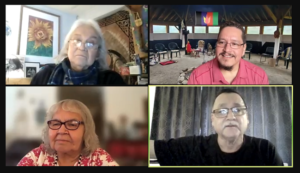Anishinabek Nation leaders discuss citizenship and E’Dbendaagzijig – Those who belong

By Rick Garrick
ANISHINABEK NATION TERRITORY — The Anishinabek Nation E’Dbendaagzijig (Citizenship) Virtual Conference featured presentations by Grand Council Chief Reg Niganobe and other leaders on the Importance of a First Nation Citizenship Law, E’Dbendaagzijig (Those Who Belong) and Impacts of Indian Status and Moving Forward under the Anishinabek Nation Governance Agreement. The conference was held on Feb. 1 via Zoom.
“We have a right to self-determination, and nothing speaks more loudly to that right than the right to determine those who belong; who is a First Nation citizen, who is Anishinabe and exactly what does that mean,” Grand Council Chief Niganobe says, noting that Anishinabe women and children were denied inclusion in their communities due to the Indian Act and thousands of Anishinabe children were taken away from their families and placed in Indian Residential Schools and foster homes. “This is our legacy under the Indian Act but now we’re looking at strengthening that circle and bringing it back together. Anishinabek have an opportunity to strengthen that circle and heal our communities by putting citizenship laws in place that recognize our family members as those who belong.”
Anishinabek Nation Southeast Regional Deputy Grand Council Chief James Marsden says the First Nation jurisdiction within the Anishinabek Nation Governance Agreement include language and culture, leadership selection, operation and management of government, and citizenship.
“Citizenship is a complex issue that we must really dig deep to solve,” Regional Deputy Grand Council Chief Marsden says, noting that his community was previously involved in a self-government agreement process under the United Anishinaabe Councils but pulled out when citizenship was not included. “Every country in this world, they determine their own citizens, so why can’t we as First Nations people determine our own citizens?”
Patrick Wedaseh Madahbee, Anishinabek Nation Commissioner on Governance and former Grand Council Chief, says First Nations need to practice inclusion, not exclusion like the Indian Act does during his Importance of a First Nation Citizenship Law presentation.
“When the Indian Act came about in 1876, they started using it as an administrative tool to try to eliminate our people,” Madahbee says. “They said we were pagans and uncivilized, they shot down our ceremonies, they shot down our beliefs, they shot down our languages, they shot down our culture and they’ve done this for over 145 years. We’re still here, we’re a very resilient people. Our Elder, the late Getzit Gordon Waindubence-baa, told us a moose is a moose, a duck is a duck, and an Anishinabe is an Anishinabe — you can’t be anything else so why the government tries to change us is beyond me, they will never change who we are as Anishinabe.”
Jeannette Corbiere Lavell, Anishinabek Nation Citizenship Commissioner, says the consequences of marrying a non-Indigenous man didn’t hit her until she received a letter a month later stating she was no longer a citizen of Wiikwemkoong Unceded Territory during her E’Dbendaagzijig (Those Who Belong) presentation.
“The impact that has on people is very hard hitting — that was the only place I knew, I was born in Wiikwemkoong, I went to school there, all my relatives are there, I had lots of friends there,” Corbiere Lavell says. “The really hurtful aspect of all of this, of taking away that sense of your identity, [was] where else could I belong, where else was my home. That is why our topic today on citizenship, E’Dbendaagzijig, is so crucial; that sense of belonging is a vital part of each individual. All of us need that sense of belonging. We are social beings, we have to live together, we have to have that social interaction. Mothers with their children, grandparents with grandchildren, all that is social interaction and this is what we have within our communities.”
Corbiere Lavell says the main message she got through her citizenship consultation process on the approved Anishinabek Nation E’dbendaagzijig Naaknigewin was they did not want the type of division in the Indian Act.
“We know who our people are, we know who our ancestors are and all we want is if you can trace your ancestry on either side, either through your mother’s side or your dad’s side and go back to your grandparents, then you are Anishinabe, you are a [citizen] of the Anishinabek Nation,” Corbiere Lavell says.
Elder Donna Debassige, member of the Anishinabek Nation Getzidijig Advisory Council, says there was “so much trauma and heartbreak” among the Indigenous women and children who lost their status under the Indian Act during her Impacts of Indian Status and Moving Forward presentation.
“Refugees in their own country, that’s basically what they ended up being,” Elder Debassige says. “We must not continue this oppression of the oppressor by using the Indian Act against our own people — we know better. The Indian Act registration and status provisions have removed so many people from their communities, it has divided families, it has divided communities in our own Nation and created so much division. Women were particularly affected because we lost Status through marrying a non-Status person, Indian or otherwise.”
The conference also featured presentations by Leanna Farr, legal counsel at Anishinabek Nation, on Anishinabek Nation Socio-Demographic Statistics; Aundeck Omni Kaning Chief Patsy Corbiere on First Nations Experiences on Existing Membership Codes; Moose Deer Point Gimaa Kwe Rhonda Williams-Lovett and Nick Stewart, director of communications and governance at Wahnapitae, on Pre-Implementation Findings on Citizenship; Fred Bellefeuille, legal counsel at Anishinabek Nation, on E’Dbendaagzijig Laws under the Anishinabek Nation Governance Agreement – Where do we start as a First Nation?; and Adrienne Pelletier, social development director at Anishinabek Nation, on Child Well-Being – The Importance of Citizenship Law.
Information and videos of the E’Dbendaagzijig conference are available online.


